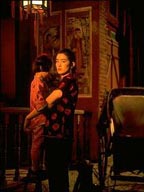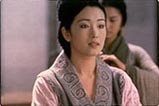 |
| The Emperor and the Assassin
|
Since the early 1980's, New Wave Chinese directors Zhang Yimou and Chen Kaige have satisfied an appetite among
westerners for hyper-Chinese moviemaking. Their films, lush with vibrant
vermilion and emperor yellow, tell the stories of Mandarin gentlemen and
their long-suffering concubines, those captured women as resplendent and
tragic as caged birds. Their pictures deliver sensual, strong-headed peasants, gender-bending Peking opera singers, effete gamblers and mob bosses with the round spectacles of Chiang Kai-shek.
But even as Zhang and Chen were being recognized by the Cannes and Venice
film festivals and the Academy Awards for their work, they were derided at home for catering to a Western desire for filmic chinoiserie. In China, the two directors are often accused of selling out to Western audiences and critics. For years many Chinese critics dismissed their releases as "for export only".
Those critics had a point. With their powerful images and icons of Chinese tradition and life -- the red silk bridal sedans, smoky mahjong parlors, painted opera singers' -- Zhang and Chen's films distilled a potent dose of China. But it was not necessarily the real China as it was ever, actually, lived. Rather, the films enshrined the country and the culture as a notion. Their films are to China what Merchant Ivory films are to England -- engaging, thoughtful caricatures of a country that never was.
Character Not Atmosphere
 |
| Zhang Yimou |
In response to his domestic critics, Zhang Yimou has endeavored to bring a more quirky and contemporary vision of mainland China to theaters. The urban comedy "Keep Cool" (1996) and the socially relevant "Story of Qiu Ju" (1992) both deal with unusual characters in mundane settings. Character, rather than atmosphere, dominate these films. With his newest film, "Not One Less," which will be released in American movie theaters in March of next year, Zhang continues to experiment with straight storytelling.
Zhang got his start as a cinematographer, and most of his films showcase
his superb eye. In "Not One Less," however, he eschews intoxicating flourishes in favor of simple, realistic presentation. The story follows a 13-year-old peasant girl recruited to act as a substitute teacher in a one-room schoolhouse. All the actors in the film are non-professionals, usually playing the same roles they play in real life. Teacher Gao, for example, is played by Gao Enman, a primary school teacher, and Mayor Tian is played by Tian Zhenda, the mayor of a suburban Beijing village.
"We kept the camera and film equipment hidden as much as possible to allow
everyone to feel as though they were in their natural surroundings,"
Zhang said. The result, just shy of being a documentary, is as true a portrait of China as we are likely to see on the big screen.
Letter from Zhang
Chinese critics will have trouble accusing Zhang of selling out to the West this time. In fact, in a radical turning of tables, "Not One Less" has drawn criticism from Western critics who see the film as Chinese propaganda. Rumors flew last summer that the film had been dubbed propaganda by reviewers at Cannes and would likely not be chosen for competition in the 1999 festival. Preempting such a move, Zhang removed the film from consideration and wrote an angry letter to Cannes officials that was published in the state-run Beijing Youth Daily.
 |
| View from To Live
|
"Everyone has their own opinion about whether a film is good or bad," Zhang
wrote. "What I cannot accept is that the West has for a long time
politicized Chinese films. If they are not anti-government, they are
considered propaganda."
The accusations arose from the fact that "Not One Less" spotlights elementary
school attrition in the Chinese countryside and delivers an optimistic,
uplifting ending. A similar film in the West might simply be
called "socially conscious." It seems na´ve to call any of Zhang's films
propaganda since he has so often been at odds with Chinese censors over
such films as "Ju Dou" and "To Live."
In the difficult balancing act of satisfying Chinese censors, prize jurors,
and international tastes, Zhang is for the moment clearly leaning towards
satisfying his Chinese audience. In his letter to the Cannes officials he
clearly stated: "I want to make movies for my fellow Chinese. Movies that
people want to see."
Marketing Savvy
 |
| Chen Kaige at Work |
Chen Kaige on the other hand clearly wants to make a film that people will
pay good money to see. His new release this season is aesthetically so much the opposite of "Not One Less" it's hard to imagine he and Zhang were film school classmates and long-time collaborators. December 17th will mark the U.S. release of Chen's US$30 million dollar historical epic "The Emperor and the Assassin." The two hour and forty five minute picture has the ambitions of Braveheart, but it will likely meet the fate of Heavens Gate or Ishtar, monstrously expensive box office and critical flops.
Chen Kaige courted international investors for this film and certainly
banked on it having international appeal. Commercially speaking he had to
make the film with a western audience in mind since it was pre-sold to
distributors worldwide to finance its completion.
Chen's marketing savvy is part and parcel of his persona as a jet setter.
The son of veteran Chinese filmmaker Chen Huaikai, Chen lived in New York
for several years when he studied filmmaking at New York University in the
late 1980s. He is currently in the process of setting up a residence
in Los Angeles.
With "The Emperor and the Assassin" Chen set out to make a global
blockbuster by applying an American budget to a great Chinese story. The
film is about the legend of Ying Zheng, the ruthless first emperor of
China. It was Ying Zheng who was responsible for starting construction on
the quintessential icon of the Middle Kingdom, the Great Wall, as well as
the Grand Canal. Other feats of his rule were the unification, by brutal
force, of the seven warring states into one great empire.
Court Politics
 |
Gong Li
in The Emperor and the Assassin
|
This is the China we know vaguely from textbooks and it has the same exotic
appeal that Japanese Shogun and samurai stories had in the 1980s, when
Western-Japanese trade relations were expanding and curiosities about that
island nation were being piqued. However, the film is terminally
melodramatic and the plot is hopelessly convoluted.
Chen's famous moviemaking father was known for his historical epics. This
heritage seems to have given Chen a certain amount of courage in
approaching his material. Certainly, the massive battle scenes are shot
with grace. But wavering between the epic and the intimate jars the
viewer and compromises the overall flow of the film.
The complex court politics and intrigue of ancient China are exploited in
"Emperor" but Chen never sufficiently hones his focus on any one aspect
of those machinations. As a result, they are never engaging.
Gong Li, as the Emperor's childhood sweetheart, and Zhang Fengyi, as the
morally torn assassin, do manage to bring depth to their characters but
even they cannot breathe real life into the stiff and melodramatic script.
Small Miracle
In terms of budget and technical achievement, however, "The Emperor and the
Assassin" is certainly a ground-breaking Chinese film. It won a Special Technical Award at Cannes this year and it is the most expensive independently
financed Chinese film ever made. Ancient palaces and cities were rebuilt, thousands of horses were corralled and extras recruited to produce authentic battle scenes. Details from props to costumes to hairstyles were meticulously researched and attended to. Five months of shooting in locations
throughout eastern China and Inner Mongolia resulted in a film that is
certainly an impressive achievement but has little in it to truly entertain
either a Western or a Chinese audience.
The position of these two directors remains for the time caught between
Chinese censors and critics, mainland and international audiences, and the
doyens of the art film circle. It's a small miracle they continue to
produce films at all, but as the body of work that is contemporary Chinese
cinema expands, so too does the understanding of China around the world.
In the meantime, Chen and Zhang just keep producing, seemingly content to leave it to others, and to history, to judge what portion of their work is in the pandering hyper-Chinese genre, what percent is propaganda, and what portion is one man's authentic vision told through film.

